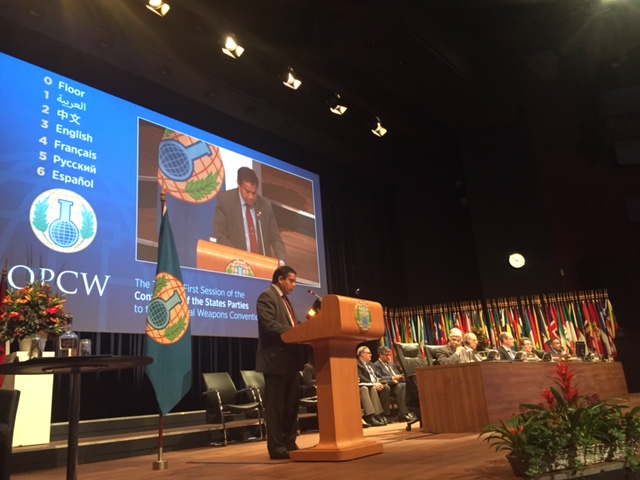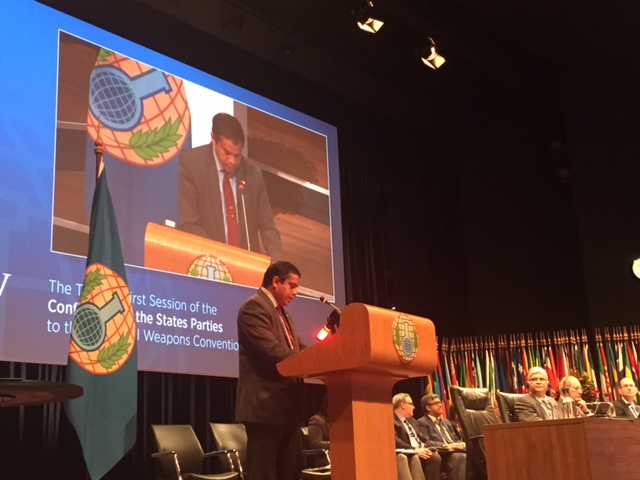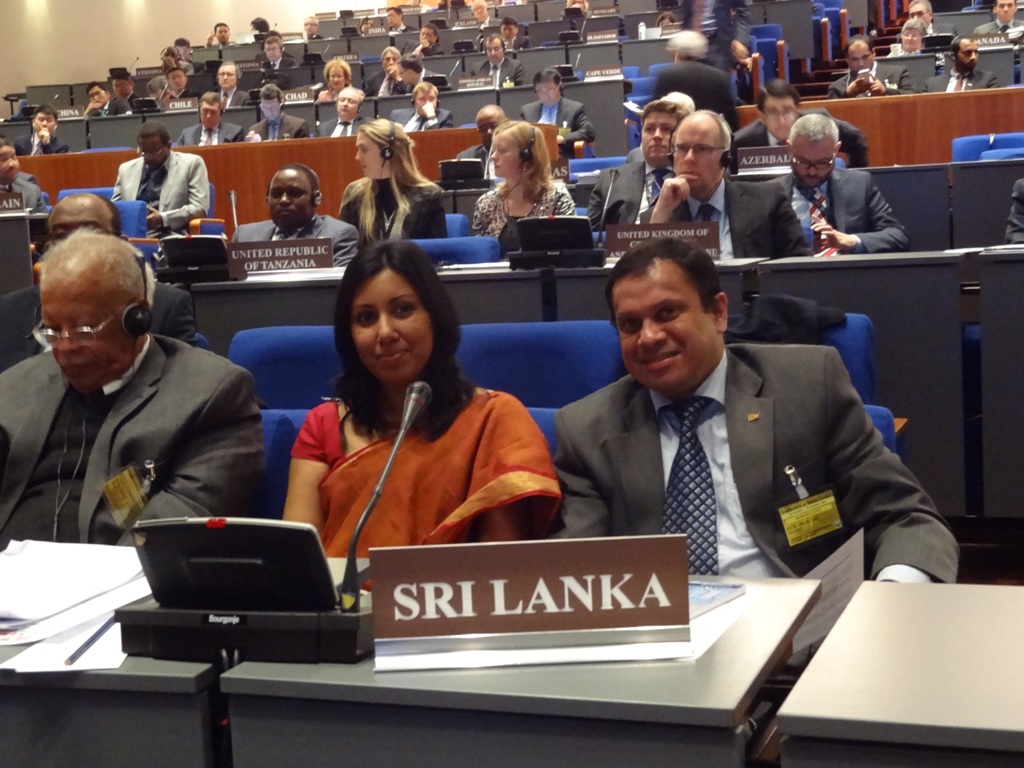
Sri Lanka has called for ways and means to address the menace of chemical terrorism, in the wake of Non-State Actors acquiring the capability to manufacture and use chemical weapons.
Participating in the General Debate on the second day of the 21st Session of the Conference of the States Parties to the Chemical Weapons Convention in The Hague yesterday, the Ambassador of Sri Lanka to The Netherlands and Permanent Representative to the Organisation for the Prohibition of Chemical Weapons (OPCW), A.M.J. Sadiq referred to the recent spate of horrendous terrorist attacks and the rise of Non-State Actors. In this context, he commended the work done by the Open Ended Working Group on Terrorism under the leadership of H.E. Dr Tony Aidoo, Ambassador of Ghana and at the Sub-Working Group on Non-State Actors, chaired by H.E. Maria Teresa Infante, Ambassador of Chile, as being important to explore and strengthen national capacities of Member States.
Ambassador Sadiq highlighted the urgent need for States to enhance their readiness and ability to meet such threats, and welcomed the establishment of the Rapid Response Assistance Team (RRAT) as a timely initiative, to enhance the capacity and the readiness of the Technical Secretariat of the OPCW to provide swift responses and assistance to States Parties, upon request, against the use of chemical weapons. He urged the OPCW not to limit the scope of the RRAT only to chemical weapons related incidents, but extend it to cover chemical accidents, as well.
The Sri Lankan Ambassador underscored the crucial need for international cooperation and assistance in the areas of verification, capacity building and assistance & protection for the peaceful applications of Chemistry and to strengthen the national capacities in chemical emergency responses.
In this regard, he announced that Sri Lanka is pleased to host the Fifth Regional Basic Training Course on Emergency Response to Chemical Incidents for States Parties in Asia, organized by the National Authority of Sri Lanka with the assistance of the Technical Secretariat from 06th to 10th February 2017, in Colombo. The objective of the Programme is to provide participants adequate training on civil defence, civil protection, and decontamination operations in contaminated areas and counter- measures in the event of incidents involving chemical warfare agents or toxic industrial chemicals.
Highlighting the role of the private sector in Sri Lanka in collaborating with the OPCW, Ambassador Sadiq stated that Camso Loadstar (Pvt) Ltd hosted the industrial attachment of two participants from Tunisia and Paraguay in September this year, as a part of the OPCW Associate Programme 2016.
Speaking further, Ambassador Sadiq welcomed the successful removal of precursor chemicals from Libya, on 27 August 2016, as part of an ongoing operation undertaken in close collaboration with the Libyan National Authority, to verifiably eliminate remaining chemical weapons stocks and thanked the Technical Secretariat and all other associated States Parties and organizations for this significant achievement.
Referring to Syria, Ambassador Sadiq stated that, “Sri Lanka attaches high importance to the Convention on the prohibition of development, production, stockpiling and the use of chemical weapons and on their destruction. In this context, Sri Lanka values the work of the OPCW. The use of chemical weapons anywhere, irrespective of circumstances, cannot be justified. The OPCW and the UN Joint Investigative Mechanism Report highlights the use of chemical weapons in Syria, which is of grave concern and we would like to emphasize the urgent need for decisive action in this regard.”
Miss Wathsala Amarasinghe, Second Secretary of the Embassy was associated with Ambassador Sadiq, as a member of the Sri Lanka delegation at the Conference.
The full text of the Country Statement is attached below.
Embassy of Sri Lanka
The Hague, The Netherlands
30th November 2016


Statement by Ambassador Adam M.J. Sadiq,
Permanent Representative of Sri Lanka to the
Organization for the Prohibition of Chemical Weapons
At the 21st Session of the Conference of the States Parties,
29th November 2016
Mr Chairperson,
Director- General,
Excellencies, Distinguished Delegates, Ladies and Gentlemen,
At the outset, on behalf of my delegation, allow me to extend warm felicitations to you, Ambassador Dr. Christoph Israng of Germany, on your election as the Chairperson of the 21st Session of the Conference of the States Parties to the Chemical Weapons Convention(CWC). I am confident that under your astute guidance , the deliberations of this Conference will lead to a successful conclusion.
I wish to take this opportunity to express our profound appreciation to Ambassador Eduardo Ibarrola–Nicolin of Mexico for his able stewardship and wise counsel during the 20th Session of the Conference of the States Parties.
Further, I would like to convey our sincere thanks to Director General H.E. Ahmet Üzümcü, for his outstanding leadership and the Technical Secretariat for its dedicated and indefatigable efforts to ensure the effective implementation of the Chemical Weapons Convention.
Mr. Chairperson,
My delegation aligns itself with the Statement delivered by the distinguished Ambassador of the Bolivarian Republic of Venezuela, H.E. Haifa Aissami on behalf of the NAM CWC States Parties and China.
We are on the threshold of celebrating the 20th anniversary of the establishment of the OPCW, which falls on 29th April 2017, providing us yet another opportunity to reflect on the road we have travelled so far in achieving the stated objective of the OPCW of chemical weapons disarmament. Comprising 192 Member States, the CWC is the only disarmament treaty that is dedicated to the total elimination of chemical weapons from the world. The OPCW, the recipient of the Nobel Peace Prize in 2013, with its vast expertise and reservoir of knowledge stands as the world’s leading chemical security organization, having successfully overseen the destruction of 94% of declared chemical weapons stockpiles in the world. With a record of such remarkable success, still the challenge of achieving a world free of chemical weapons remains unfulfilled.
The recent spate of horrendous terrorist attacks and the rise of Non-State Actors and their capability to manufacture and use chemical weapons and toxic chemicals, highlight the urgent need for States to enhance their readiness and ability to meet such threats. In this context, we commend the establishment of the Rapid Response Assistance Team (RRAT) as a timely initiative, to enhance the capacity and the readiness of the Technical Secretariat to provide swift responses and assistance to the States Parties upon request against the use of chemical weapons. We believe that the scope of the RRAT should not be limited to chemical weapons related incidents but also extended to cover chemical accidents.
Mr. Chairperson,
My delegation believes that the ongoing discussions in the Open Ended Working Group on Terrorism under the able leadership of H.E. Dr Tony Aidoo, Ambassador of Ghana and at the Sub-Working Group on Non-State Actors under the stewardship of H.E. Maria Teresa Infante, Ambassador of Chile, are of the utmost importance to explore ways and means to address the menace of chemical terrorism and strengthen national capacities of Member States.
Mr Chairperson,
As identified during these deliberations, my delegation believes that the full and effective implementation of Article VII remains paramount in addressing the threat posed by Non-State Actors using chemical weapons, as well as toxic chemicals as weapons. In this regard, Sri Lanka welcomes the assistance provided by the Technical Secretariat to States Parties, which do not have enabling national legislation, to draft relevant laws. However, we believe that the Technical Secretariat should also assist States Parties which already have such legislation, in order to enable them to review and upgrade their existing national measures in keeping with current developments. Technical assistance and support of such measures, should be provided through tailor made programmes, following a careful study of the needs of States Parties, since one size does not fit all.
Mr. Chairperson,
My delegation underscores the crucial need for international cooperation and assistance in the areas of verification, capacity building and assistance & protection for the peaceful applications of Chemistry and to strengthen the national capacities in chemical emergency responses. In this context, I am pleased to announce that the Fifth Regional Basic Training Course on Emergency Response to Chemical Incidents for States Parties in Asia, organized by the National Authority of Sri Lanka with the assistance of the Technical Secretariat will be held from 06th to 10th February 2017, in Colombo, Sri Lanka. The objective of the Programme is to provide participants adequate training on civil defence, civil protection, and decontamination operations in contaminated areas and counter- measures in the event of incidents involving chemical warfare agents or toxic industrial chemicals.
Further, as a part of the OPCW Associate Programme 2016, Camso Loadstar Pvt Ltd of Sri Lanka hosted the industrial attachment of two participants from Tunisia and Paraguay in September 2016.
Mr. Chairperson,
In strengthening the future role of the OPCW as an efficient and effective disarmament organization, my delegation welcomes with profound appreciation, the establishment of the Open Ended Working Group on Future Priorities, under the able leadership of co-chairs, H.E. Sabine Nolke, Ambassador of Canada and H.E. Bruce Koloane, Ambassador of South Africa. We are confident that, given the vast and multifaceted experience of the two co-Chairs, the Working Group would be able to formulate a balanced, well focused programme of work and methods with the cooperation of States Parties, to be taken up at the Fourth Review Conference in 2018.
Mr. Chairperson,
Sri Lanka, as an early signatory to the Chemical Weapons Convention in 1993, remains fully committed to the principles on which the OPCW was founded. My delegation wishes to emphasize that the full, effective and non-discriminatory implementation of all provisions of the Convention, including Article XI is crucial in reaching the full potential of the Convention. In this context, we appreciate the efforts by the Technical Secretariat in organizing the recently concluded “Review & Evaluation Workshop on the Components of an Agreed Framework for the Full Implementation of Article XI”.
Mr. Chairperson,
Sri Lanka wishes to take this opportunity to remind Possessor States to take necessary steps without any further delay to expedite the destruction of their declared chemical weapons stockpiles, old chemical weapons and abandoned chemical weapons as stipulated, since the existence of such chemical weapons continues to pose a threat to global security.
We welcome the announcement of the successful removal of precursor chemicals from Libya, on 27 August 2016, as part of an ongoing operation undertaken in close collaboration with the Libyan National Authority, to verifiably eliminate remaining chemical weapons stocks and sincerely thank the Technical Secretariat and all other associated States Parties and organizations for this significant achievement.
Mr. Chairperson,
Sri Lanka attaches high importance to the Convention on the prohibition of development, production, stockpiling and the use of Chemical Weapons and on their destruction. In this context, Sri Lanka values the work of the OPCW. The use of chemical weapons anywhere, irrespective of circumstances, cannot be justified. The OPCW and the UN Joint Investigative Mechanism Report highlights the use of chemical weapons in Syria , which is of grave concern and we would like to emphasize the urgent need for decisive action in this regard.
Mr. Chairperson,
In conclusion, I would like to request that this Statement to be circulated as an official series document of this Conference and to be placed on the OPCW website and extranet.
Thank you.




